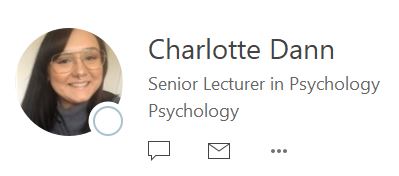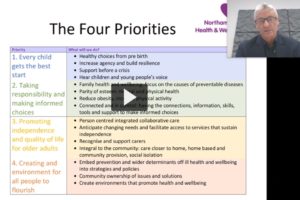NILE is integrated into the Active Blended Learning (ABL) process at The University of Northampton and we need to ensure that it is being used effectively by staff in order to provide a quality student experience.
Building on the guidance which was initially produced in January 2012, the framework has now been updated to cover the minimum standards which are expected on a NILE site. This was approved at University SEC in March, 2020 and is subsequently being used as the basis for the new NILE templates which have been developed for the 2020/21 academic year.
Guidance is also provided on how to set up NILE courses for the upcoming academic year?
Reflecting on being ‘Tech Savvy’

It has come as a really pleasant surprise to be awarded Tech Savvy Lecturer of the Year, especially on the back of my Advancing Equality and Diversity Award last year. More than anything, it means a lot because this is voted for my students, and it is their recognition that really makes the difference for me.
So I’ve been thinking about what it means to be ‘tech savvy’, and I’ve considered the different kinds of tools and systems that have worked for me over the last year. And that brings me to my first reflection – finding a tool that works for you. As we are an ABL-informed campus, I want to use technology in a way that supports and enhances learning, rather than using technology just for the novelty. I’ve tried a lot of different tools over the years, but at the moment, my favourites are:
- Padlet – I really love Padlet as a tool for learning. It acts as a digital corkboard, essentially, and is great for visually capturing thoughts that can inform both in-class and online discussion. Here is an example of one of my favourites, one that I use year-on-year for in-class discussions on gender: https://en-gb.padlet.com/charlotte_dann/gender
- Google Docs – I like collaborative activities, but I appreciate that students like to collaborate in different ways. I have just a couple of examples dotted across my modules where I’ve used Google Docs to capture in-class group work, that we can discuss in live time. As the document is accessible to students, they can come back to this and reflect on it as needed after the discussion too. This is key for me in the use of technology – learning happens outside of the classroom environment, so those activities should still be available to draw on. A favourite example of an effective Google Doc is from my level 6 module Lifespan Development, but was actually based on their assignment rubric – students added their ideas as to what they needed to do to achieve each learning outcome, as organised by grade: http://bit.ly/36f4WYk
- Twitter – I am a lover of social media, though I appreciate it is not everyone’s cup of tea. On top of that, there are so many different platforms now, it’s difficult to decide which would be best to use. I favour Twitter for academic-related content (alongside dog memes), because it provides a short and sharp way of communicating, sharing, and engaging students outside of the classroom. I can share fellow academics papers, start a ‘hashtag’ discussion, or introduce students to other academics they might want to follow for updates. Though not all students use the platform, my profile is not private, so can be viewed without an account. Personally, I benefit from engaging with other academics and sharing best practice on there too. My tip, I guess, would be to find and learn about a platform that would be best for you. https://twitter.com/CharlotteJD
To wrap up, I have to acknowledge how tools are only part of the story in terms of using technology. Any time I want to try something new, or consider use in the classroom (or indeed, online learning) I ask:
- What does engagement look like?
- What is the purpose?
I like to use technology in an interactive way, so I have to consider what engagement looks like, not just for the students, but also for me. If I have a Padlet-related activity for a week, I’ll schedule out time in my diary to check it and give feedback, rather than leave it static. For the social media platforms I use (TikTok has recently taken over my life!) I plan to record and release videos daily, for consistency. And then coming to purpose – if the people that engage with the tools do not understand how it relates to the content, or see a value in it, they won’t use it. I like to make the purpose explicit, linking it to discussions we will have, or to assignments, rather than not revisiting them again.
Overall, technology, and the way we use it, is ever-evolving (even more so, taking our current worldwide situation into account). The more we share and learn from each other – students included!- the better our understanding of what works will be.
Are you struggling to use NILE? Do you want some help getting started with Word, Excel or PowerPoint? Do you know how to access LinkedIn Learning to get loads of technical help and support?
The Learning Technology Team are hosting a series of student drop in sessions to help with basic NILE and Microsoft Office problems.

NILE will be down for scheduled maintenance. Between the 28 December and 29 December you will be unable to login to NILE to access resources or submit any assessments online. Other University systems should not be impacted by this work. [Detailed information about the nature of the maintenance is shown at the bottom of this posting.]
If you were planning on making use of the Christmas vacation to get a lot of work done that involves NILE, please make sure that you log-in and download any resources that you need before Saturday 28 December.
Students – If you are due to submit assignments during this time, please be assured that your deadline will be extended to reflect this downtime. Please check with your Module Leader for more information relating to assignment deadlines.
If you have any questions about the NILE downtime, please contact Rob Howe, by emailing rob.howe@northampton.ac.uk
Detailed information on the nature of the maintenance.
Blackboard is currently hosted with Managed hosting in Amsterdam. As part of updating contracts, there is a move of the physical hosting from Amsterdam to Amazon Webservices (AWS) in Frankfurt. There will be a full data migration from Saturday 28 December and then the NILE service will continue to be unavailable until Sunday 29 December for quality checks and to allow web services redirections to take place. This blog will be updated if there are any changes to timescales.
The key benefits of this move will be:
- Updating of all patches and fixes since August 2019.
- Higher uptime (99.99%).
- Continuous release which means less time needed for downtime during the year.
- Quicker implementation of patches (Currently we have to take the service down to implement any patch or fix).
- Features implemented quicker (Currently we only schedule major feature implementation once a year).
- Ability to stage move to Blackboard Ultra – the latest release of Blackboard – with higher levels of accessibility and usability.
NILE is integrated into the Active Blended Learning (ABL) process at The University of Northampton and we need to ensure that it is being used effectively by staff in order to provide a quality student experience.
Building on the guidance which was initially produced in January 2012, the framework has now been updated to cover the minimum standards which are expected on a NILE site. This was approved at University SEC in March, 2019 and is subsequently being used as the basis for the new NILE templates which have been developed for the 2019/20 academic year.
[Post published on behalf of Ale Armellini]
The purpose of this paper is to introduce an evidence-based, transferable framework of graduate attributes and associated university toolkit to support the writing of level-appropriate learning outcomes aligned to Active Blended Learning (ABL), Northampton’s approach to learning and teaching. An iterative process of co-design and co-development was employed to produce both the framework and the associated learning outcomes toolkit. There is tangible benefit in adopting an integrated framework aligned to the principles of ABL, which enables students to develop personal literacy and graduate identity. The toolkit enables staff to write assessable learning outcomes that support student progression and enable achievement of the framework objectives. Embedding the institutional Changemaker attributes alongside the agreed employability skills enables students to develop and articulate specifically what it means to be a “Northampton graduate”. The uniqueness of this project is the student-centred framework and the combination of curricular, extra- and co-curricular initiatives that provide a consistent language around employability across disciplines. This is achieved through use of the learning outcomes toolkit to scaffold student progression.
See the full paper on the framework of graduate attributes and ABL
Keywords: Active blended learning, ChANGE, COGS, Employability and entrepreneurship, Graduate identity, Personal literacy, Active Blended Learning, ABL.
Nick Petford (VC, Northampton) was asked to keynote at a recent Northamptonshire Health and Wellbeing Board but due to his hectic schedule, was unable to attend in person. Rather than sending his apologies, Nick made use of Kaltura to record his presentation and ensure that he was able to contribute to the event.
Following a short test to ensure that everything was working as expected, Nick tucked himself into one of the bookable small rooms in the Learning Hub at Waterside and was able to complete the recording without any assistance. This was then uploaded and available to send to the conference Chair a few moments later. Nick was then able to rush off to the next appointment on his schedule.

Nick Petford keynote
Commenting on his experience, Nick said,
“I really valued the easy and flexibility which Kaltura provided to record the presentation. I used my own laptop and booked a room which was available to any member of staff – there was very little technical preparation and no special equipment needed.”
If you have not yet had the chance to have a go with Kaltura to create any type of video recording such as a presentation or feedback to students, then please contact your local Learning Technologist.
Recent Posts
- Blackboard Upgrade – February 2026
- Blackboard Upgrade – January 2026
- Spotlight on Excellence: Bringing AI Conversations into Management Learning
- Blackboard Upgrade – December 2025
- Preparing for your Physiotherapy Apprenticeship Programme (PREP-PAP) by Fiona Barrett and Anna Smith
- Blackboard Upgrade – November 2025
- Fix Your Content Day 2025
- Blackboard Upgrade – October 2025
- Blackboard Upgrade – September 2025
- The potential student benefits of staying engaged with learning and teaching material
Tags
ABL Practitioner Stories Academic Skills Accessibility Active Blended Learning (ABL) ADE AI Artificial Intelligence Assessment Design Assessment Tools Blackboard Blackboard Learn Blackboard Upgrade Blended Learning Blogs CAIeRO Collaborate Collaboration Distance Learning Feedback FHES Flipped Learning iNorthampton iPad Kaltura Learner Experience MALT Mobile Newsletter NILE NILE Ultra Outside the box Panopto Presentations Quality Reflection SHED Submitting and Grading Electronically (SaGE) Turnitin Ultra Ultra Upgrade Update Updates Video Waterside XerteArchives
Site Admin

